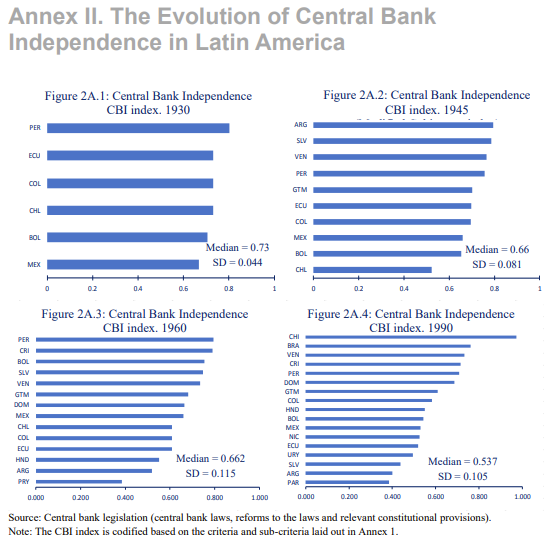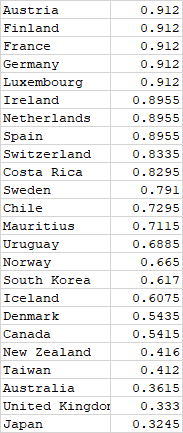It's probably not possible to definitively answer this Q, but Costa Rica is a full democracy according to the index you linked (although only since 2018), but until recently [June 2023] they had the finance minister sit on the board of the bank. There was apparently some IMF pressure because of that too:
In October 2020, the IMF issued a safeguards assessment advising improvements to “the BCCR’s operational autonomy and governance arrangements”. It also recommended Costa Rica’s government fill one of the external member positions.
There are some attempts to formally quantify central bank independence, e.g. as noted in this paper by the Central Bank of Uruguay, but they are pretty old, from the 1990s, and I'm not sure they are regularly updated/recalculated. I found a 2022 IMF working paper about Latin America (so other regions are not covered there) but even in that one the (independence) data is from the 1990s at best.

And the least independent appear to be Japan and the UK according to the dataset for 2017 that goes with this paper by an Ireland-based academic (Romelli). The CBIE scores that the author calculates are as low as those of Turkmenistan or Belarus (all around 0.33). [Higher scores indicate more independence.] Australia is rated not much higher with 0.36, on par with Cuba and Iran. Some other interesting ties in that data set: USA is on par with Uzbekistan (and Kazakhstan) with 0.63 or so, and lower than the PRC's with 0.68 or so. As for Costa Rica, it's rated on par with Switzerland and Turkey's, with around 0.83-0.84, and which are rated only slightly above Venezuela that gets 0.82. YMMV. A lot seems to depend on methodology in such matters.
As for methodology, from some 2019 slides of the author: "42 questions on central bank design across 6 dimensions: 1) Governor and Central Bank Board; 2) Monetary Policy and Conflicts Resolution; 3) Objectives; 4) Lending to the Government; 5) Financial Independence; 6) Central Bank Reporting and Accountability. Overall index computed as the aritmetic average of the scores across
the six dimensions".
BTW, Romelli's index appears to have been around since at least 2019, but people at the IMF don't seem to dig it. His 2019 paper is not incredibly cited, with some 50 citations in Google Scholar. But according to his slides, his is the only new index proposed/updated since the 1990s, so there's that.
OTOH ther's a slightly older paper by (UK-based) A.C. Garriga (2016) that has approximated ten times more citations.
It uses a 'de jure' approach focusing only on legislation; this has been the more traditional approach. And the author has an updated the dataset in 2023 (although without a new paper, AFAICT). More or less the latest data included is for 2012 though. But as a spot check:
- Japan has weighed score of 0.44 and an unweighted one of 0.55.
- UK has 0.59 and respectively 0.70.
- Australia 0.35 and 0.25.
- US : 0.4 and respectively 0.48.
- Costa Rica: 0.73 and 0.73.
And for [some] comparison
- China : 0.5 0.55
- Uzbekistan: 0.64 and 0.6
So there are some agreements, but also disagreement with Romelli. In particular, the UK or Japan aren't anywhere near as low on the independence scale according to Garriga, but Australia is. And the lowest (among the "full democracies") might actually be Taiwan according to Garriga: scores of 0.27 and 0.19 respectively.

